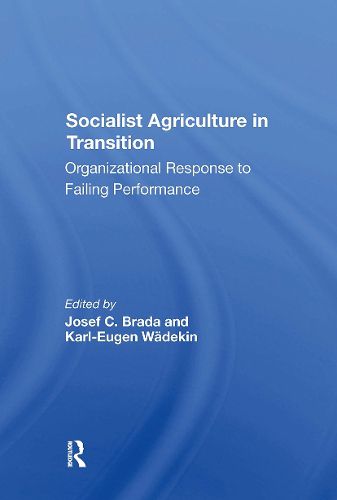Readings Newsletter
Become a Readings Member to make your shopping experience even easier.
Sign in or sign up for free!
You’re not far away from qualifying for FREE standard shipping within Australia
You’ve qualified for FREE standard shipping within Australia
The cart is loading…






Because of altered investment priorities, policymakers in socialist countries can no longer increase the resources devoted to agriculture as they have in the past. Instead, they must seek alternative means of improving agricultural performance. One approach has been to change the structure of socialist agriculture and to foster organizational changes within agricultural units. The contributors to this volume evaluate such reforms and weigh their implications for agricultural output and trade. They examine the normless links being introduced in the USSR and compare Soviet experiences with the successes of Chinese and Hungarian reorganizations; describe and analyze the changes being implemented in the German Democratic Republic, Yugoslavia, and Vietnam; and pay particular attention to the role of Polish agriculture in the production crisis and to agriculture's potential for improving Poland's overall economic performance. The contributors also address issues of infrastructure development, the incentives being developed to foster more efficient allocation of resources within the agricultural sector, and the likely growth of East-West and intra-socialist agricultural trade.
$9.00 standard shipping within Australia
FREE standard shipping within Australia for orders over $100.00
Express & International shipping calculated at checkout
Because of altered investment priorities, policymakers in socialist countries can no longer increase the resources devoted to agriculture as they have in the past. Instead, they must seek alternative means of improving agricultural performance. One approach has been to change the structure of socialist agriculture and to foster organizational changes within agricultural units. The contributors to this volume evaluate such reforms and weigh their implications for agricultural output and trade. They examine the normless links being introduced in the USSR and compare Soviet experiences with the successes of Chinese and Hungarian reorganizations; describe and analyze the changes being implemented in the German Democratic Republic, Yugoslavia, and Vietnam; and pay particular attention to the role of Polish agriculture in the production crisis and to agriculture's potential for improving Poland's overall economic performance. The contributors also address issues of infrastructure development, the incentives being developed to foster more efficient allocation of resources within the agricultural sector, and the likely growth of East-West and intra-socialist agricultural trade.